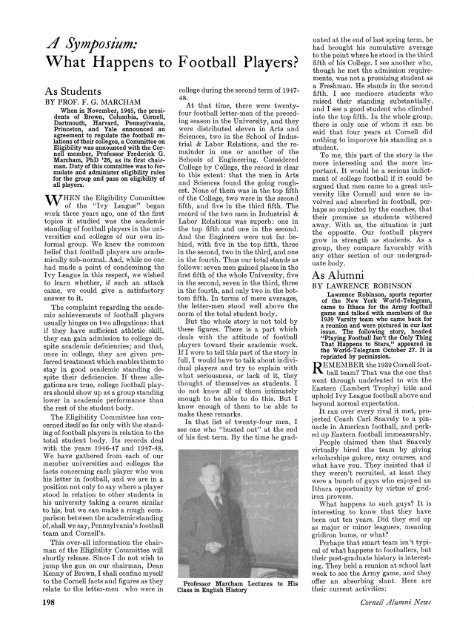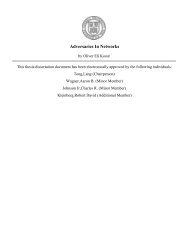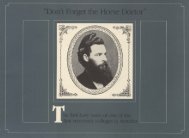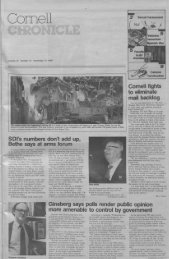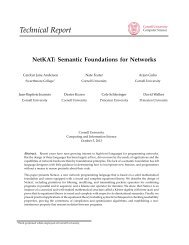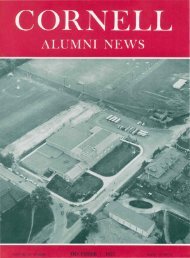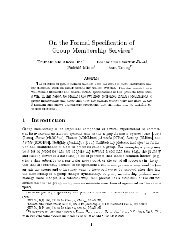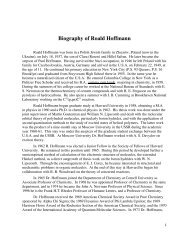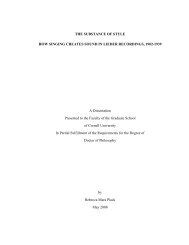Cornell Alumni News - eCommons@Cornell
Cornell Alumni News - eCommons@Cornell
Cornell Alumni News - eCommons@Cornell
You also want an ePaper? Increase the reach of your titles
YUMPU automatically turns print PDFs into web optimized ePapers that Google loves.
Symposium:<br />
What Happens to Football Players?<br />
As Students<br />
BY PROF. F. G. MARCHAM<br />
When in November, 1945, the presidents<br />
of Brown, Columbia, <strong>Cornell</strong>,<br />
Dartmouth, Harvard, Pennsylvania,<br />
Princeton, and Yale announced an<br />
agreement to regulate the football relations<br />
of their colleges, a Committee on<br />
Eligibility was announced with the <strong>Cornell</strong><br />
member, Professor Frederick G.<br />
Marcham, PhD '26, as its first chairman.<br />
Duty of this committee was to formulate<br />
and administer eligibility rules<br />
for the group and pass on eligibility of<br />
all players.<br />
V^ΓTΉEN the Eligibility Committee<br />
^* of the "Ivy League" began<br />
work three years ago, one of the first<br />
topics it studied was the academic<br />
standing of football players in the universities<br />
and colleges of our own informal<br />
group. We knew the common<br />
belief that football players are academically<br />
sub-normal. And, while no one<br />
had made a point of condeminng the<br />
Ivy League in this respect, we wished<br />
to learn whether, if such an attack<br />
came, we could give a satisfactory<br />
answer to it.<br />
The complaint regarding the academic<br />
achievements of football players<br />
usually hinges on two allegations: that<br />
if they have sufficient athletic skill,<br />
they can gain admission to college despite<br />
academic deficiencies; and that,<br />
once in college, they are given preferred<br />
treatment which enables them to<br />
stay in good academic standing despite<br />
their deficiencies. If these allegations<br />
are true, college football players<br />
should show up as a group standing<br />
lower in academic performance than<br />
the rest of the student body.<br />
The Eligibility Committee has concerned<br />
itself so far only with the standing<br />
of football players in relation to the<br />
total student body. Its records deal<br />
with the years 1946-47 and 1947-48.<br />
We have gathered from each of our<br />
member universities and colleges the<br />
facts concerning each player who won<br />
his letter in football, and we are in a<br />
position not only to say where a player<br />
stood in relation to other students in<br />
his university taking a course similar<br />
to his, but we can make a rough comparison<br />
between the academic standing<br />
of, shall we say, Pennsylvania's football<br />
team and <strong>Cornell</strong>'s.<br />
This over-all information the chairman<br />
of the Eligibility Committee will<br />
shortly release. Since I do not wish to<br />
jump the gun on our chairman, Dean<br />
Kenny of Brown, I shall confine myself<br />
to the <strong>Cornell</strong> facts and figures as they<br />
relate to the letter-men who were in<br />
198<br />
college during the second term of 1947-<br />
48.<br />
At that time, there were twentyfour<br />
football letter-men of the preceding<br />
season in the University, and they<br />
were distributed eleven in Arts and<br />
Sciences, two in the School of Industrial<br />
& Labor Relations, and the remainder<br />
in one or another of the<br />
Schools of Engineering. Considered<br />
College by College, the record is clear<br />
to this extent: that the men in Arts<br />
and Sciences found the going roughest.<br />
None of them was in the top fifth<br />
of the College, two were in the second<br />
fifth, and five in the third fifth. The<br />
record of the two men in Industrial &<br />
Labor Relations was superb: one in<br />
the top fifth and one in the second.<br />
And the Engineers were not far behind,<br />
with five in the top fifth, three<br />
in the second, two in the third, and one<br />
in the fourth. Thus our total stands as<br />
follows: seven men gained places in the<br />
first fifth of the whole University, five<br />
in the second, seven in the third, three<br />
in the fourth, and only two in the bottom<br />
fifth. In terms of mere averages,<br />
the letter-men stood well above the<br />
norm of the total student body.<br />
But the whole story is not told by<br />
these figures. There is a part which<br />
deals with the attitude of football<br />
players toward their academic work.<br />
If I were to tell this part of the story in<br />
full, I would have to talk about individual<br />
players and try to explain with<br />
what seriousness, or lack of it, they<br />
thought of themselves as students. I<br />
do not know all of them intimately<br />
enough to be able to do this. But I<br />
know enough of them to be able to<br />
make these remarks.<br />
In that list of twenty-four men, I<br />
see one who "busted out" at the end<br />
of his first term. By the time he grad-<br />
Professor Marcham Lectures to His<br />
Class in English History<br />
uated at the end of last spring term, he<br />
had brought his cumulative average<br />
to the point where he stood in the third<br />
fifth of his College. I see another who,<br />
though he met the admission requirements,<br />
was not a promising student as<br />
a Freshman. He stands in the second<br />
fifth. I see mediocre students who<br />
raised their standing substantially,<br />
and I see a good student who climbed<br />
into the top fifth. In the whole group,<br />
there is only one of whom it can be<br />
said that four years at <strong>Cornell</strong> did<br />
nothing to imporove his standing as a<br />
student.<br />
To me, this part of the story is the<br />
more interesting and the more important.<br />
It would be a serious indictment<br />
of college football if it could be<br />
argued that men came to a great university<br />
like <strong>Cornell</strong> and were so involved<br />
and absorbed in football, perhaps<br />
so exploited by the coaches, that<br />
their promise as students withered<br />
away. With us, the situation is just<br />
the opposite. Our football players<br />
grow in strength as students. As a<br />
group, they compare favorably with<br />
any other section of our undergraduate<br />
body.<br />
As <strong>Alumni</strong><br />
BY LAWRENCE ROBINSON<br />
Lawrence Robinson, sports reporter<br />
of the New York World-Telegram,<br />
came to Ithaca for the Army football<br />
game and talked with members of the<br />
1939 Varsity team who came back for<br />
a reunion and were pictured in our last<br />
issue. The following story, headed<br />
"Playing Football Isn't the Only Thing<br />
That Happens to Stars," appeared in<br />
the World-Telegram October 27. It is<br />
reprinted by permission.<br />
the 1939 <strong>Cornell</strong> foot-<br />
R EMEMBER<br />
ball team? That was the one that<br />
went through undefeated to win the<br />
Eastern (Lambert Trophy) title and<br />
uphold Ivy League football above and<br />
beyond normal expectation.<br />
It ran over every rival it met, projected<br />
Coach Carl Snavely to a pinnacle<br />
in American football, and perked<br />
up Eastern football immeasurably.<br />
People claimed then that Snavely<br />
virtually hired the team by giving<br />
scholarships galore, easy courses, and<br />
what have you. They insisted that if<br />
they weren't recruited, at least they<br />
were a bunch of guys who enjoyed an<br />
Ithaca opportunity by virtue of gridiron<br />
prowess.<br />
What happens to such guys? It is<br />
interesting to know that they have<br />
been out ten years. Did they end up<br />
as major or minor leaguers, meaning<br />
gridiron bums, or what?<br />
Perhaps that smart team isn't typical<br />
of what happens to footballers, but<br />
their post-graduate history is interesting.<br />
They held a reunion at school last<br />
week to see the Army game, and they<br />
offer an absorbing slant. Here are<br />
their current activities:<br />
<strong>Cornell</strong> <strong>Alumni</strong> <strong>News</strong>


